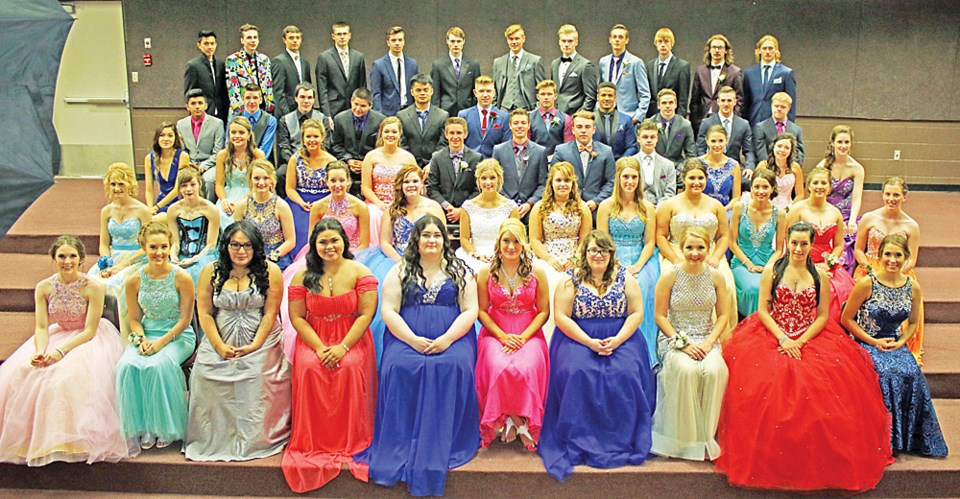All things considered, many recent graduates from Tisdale Middle & Secondary School were pleased with how well they were prepared for post-secondary, though they did have a few suggestions for their alma mater.
Seven graduates from 2016 spoke to the Review via social media.
Levi Perrault, for example, is taking a combined program for political science, philosophy and economics at the University of Regina. He found that TMSS had a lack of specific discipline classes like economics.
“It just meant studying a little harder,” Perrault wrote. “But I did make up for it over the summer by doing some research into the basics. It really helped to lessen the blow when I actually got to university.”
Perrault is realistic when it comes to what TMSS can offer.
“Adding more classes such as French would be nice, but that isn’t feasible for a school with a small population and funding,” he wrote.
Enforcing deadlines
Perrault and Rochelle Leader, who is taking graphic communications at Saskatchewan Polytechnic in Regina, both agreed on something TMSS can do to improve: enforce deadlines.
“No second chances on assignments and late hand-ins,” Leader recommended. “In post-secondary there are no second chances or exceptions for that kind of behaviour and I found that to be quite a shock during my transfer.”
Leader noted that TMSS helped her attain skills outside of academics.
“I think a lot of my people skills came from TMSS, and that is very important in my field.”
Leader also wrote that the school provided plenty of artistic opportunities.
“I feel the overall environment of TMSS was a great place to begin my career as a student. I was offered many opportunities to explore my artistic abilities, which in turn led me to my graphic design course and the path I have chosen for my career.”
More... homework?
That’s the suggestion Justice Litzenberger wrote in her message to the Review.
“Something that could’ve helped prepare students for post-secondary is maybe assigning more homework. Although that does suck, it would help students get into good habits of managing their time in order to get their homework done,” she wrote.
Litzenberger is at Saskatchewan Polytechnic in Moose Jaw, studying architectural technologies and building sciences. She had positive feedback for her TMSS teachers as well.
“I feel as though the teachers helped us strive to succeed and to even exceed our own expectations of ourselves and to try and get higher marks and not to just get by with low marks,” she wrote.
“With them teaching us this, I have carried on striving for good grades, and exceeding my own expectations of myself in everything I do.”
Every student the Review spoke to had good feedback to go along with their suggestions.
Rey Tatad, who is at the University of Regina, is switching from the Bachelor of Arts program to a fine arts program this semester. He spoke positively about his TMSS experience.
“To be honest, I think they did the best that they can. I was able to make a decision on which university to go to and whether or not I should pursue my long love and interest of art... thanks to the guidance counsellor and several teachers.”
Choosing TMSS
Madison Hewitt had a choice to make after finishing elementary school in Archerwill. Would she go to high school in Tisdale, Rose Valley or Naicam?
“I went to TMSS because I knew the academics were going to drive me to be better in university.”
Plus, switching schools the first time helped her while transitioning to Saskatchewan Polytechnic in Saskatoon, where she is studying nursing.
Hewitt and Brett Elmslie mentioned that writing formats changed when they moved from secondary to post-secondary. Elmslie is in the same program as Hewitt.
“At TMSS we were always expected to be writing in MLA [Modern Language Association writing style]. So it would have been nice in the numerous years of English classes if we explored other writing formats such as APA [American Psychological Association style],” Elmslie wrote.
Making the transition
Ciara Lykken is taking correctional studies at Saskatchewan Polytechnic in Prince Albert. She would have liked to start preparing for applications as early as Grade 11, so students would have more time to look through their options.
Lykken found the transition from high school went smoothly.
“My program is actually very comparable to high school, so I find myself knowing a lot of the material we go over in class, especially in the law classes. It was really easy to transition into post-secondary schooling,” Lykken wrote.
The students had advice for Grade 12s who are anticipating making that transition in the fall.
“Definitely never settle for any career or path. We are young and now is the time to start building a life we can be proud of someday,” wrote Leader.
“Some advice I’d like to give is to stick to the goals that you have set out for yourself, and to keep trying and trying to reach that goal until you eventually do,” wrote Litzenberger. “And to be thankful for Mrs. [Sharolyn] Simoneau’s great teaching skills!”
“Get your ducks in a row because the sooner you get things in order to go to post-secondary, the easier it will be. Also, take school seriously but don’t be afraid to live a little and try new things or meet new friends,” said Perrault.
Finally, Elmslie reminded future graduates to enjoy school while they’re there.
“It’s true that graduating and moving away to school is fun and exciting but you really do miss it, even if you think you won’t. So put down the phone, turn off Netflix, and go to the football game or take a break from studying and spend a night with your friends.”




